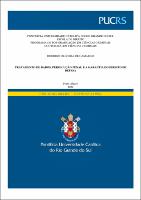| Share record |


|
Please use this identifier to cite or link to this item:
https://tede2.pucrs.br/tede2/handle/tede/10605| Document type: | Tese |
| Title: | Tratamento de dados, persecução penal e garantia do direito de defesa |
| Author: | Camargo, Rodrigo Oliveira de  |
| Advisor: | Pozzebon, Fabrício Dreyer de Ávila |
| Abstract (native): | O problema central da investigação é compreender onde se encontra o espaço de garantia da defesa nas atividades de tratamento de dados pessoais e abertos, especialmente no que guarda relação com a com a persecução penal e o respeito à paridade de armas. Problema esse inserido na necessidade, mais do que urgente, de interseccionar as áreas temáticas relacionadas à tecnologia, especificamente o tratamento de dados, com aquelas relativas à investigação criminal, processo penal e o direito de defesa. O tema foi delimitado em torno de métodos de tratamentos de dados à disposição das agências de controle do poder punitivo e, como objetivo geral, nos propusemos a identificar como cada um deles garante o exercício do direito de defesa. A partir daí, passamos a demonstrar como, em relação ao processo penal, tais direitos são, muitas vezes, insuficientes e a propor alternativas a esta realidade para assegurar os princípios constitucionais relacionados ao processo penal em meio às atividades de tratamento de dados, mormente o devido processo legal e suas principais ramificações: contraditório, ampla defesa e paridade de armas. Estruturado em cinco capítulos, o trabalho parte da contextualização do leitor na realidade de uma nova formação social onde a informação advinda do contexto tecnológico passa a ser considerada a chave da economia mundial e que insere a convergência tecnológica como condição de mudança na essência do ser humano e das estruturas de poder, para, então, apresentar o atual estado da arte em relação ao tratamento de dados pessoais e provenientes de fontes abertas para fins de persecução penal e como forma de garantia da defesa. A pesquisa adotou como estratégia metodológica a revisão sistemática, a análise crítica de pesquisa bibliográfica, pesquisa jurisprudencial e análise jurídico-dogmática de marcos nacionais e internacionais. A conclusão nos leva à emergência de discussão sobre a necessidade de novos direitos, prerrogativas e estruturas às defesas para suportar, com segurança, o exercício de suas atribuições, propondo-se alterações nos códigos deontológicos da advocacia e defensoria para assegurar o tratamento de dados como direito inerente às atividades de defesa. |
| Abstract (english): | The central problem of the investigation is to understand where the space for defense protection is in the activities of processing personal and open data, especially in relation to criminal prosecution and respect for the equality of arms. This problem is inserted in the urgent need to intersect the thematic areas related to technology, specifically data processing, with those related to criminal investigation, criminal procedure and the right of defense. The theme was delimited around data processing methods available to agencies that control punitive power and, as a general objective, we proposed to identify how each one of them protects the exercise of the right to defense. From there, we went on to demonstrate how, in relation to the criminal process, these rights are often insufficient and to propose alternatives to this reality in order to assure the constitutional principles related to the criminal process in the midst of data processing activities, especially the due legal process and its main ramifications: adversarial process, ample defense, and equality of arms. Structured in five chapters, the work begins with the contextualization of the reader in the reality of a new social formation where the information coming from the technological context is now considered the key to the world economy and which inserts the technological convergence as a condition for change in the essence of the human being and the structures of power, in order to then present the current state of the art in relation to the treatment of personal data from open sources for the purposes of criminal prosecution and as a form of defense protection. The research adopted as methodological strategy the systematic review, the critical analysis of bibliographical research, jurisprudential research and legal-dogmatic analysis of national and international frameworks. The conclusion leads us to the emergence of discussion about the need for new rights, prerogatives and structures to the defenses to support, safely, the exercise of their duties, proposing changes in the deontological codes of law and defense to ensure the processing of data as a right inherent to the activities of defense. |
| Keywords: | Tratamento de Dados Dados Pessoais Fontes Abertas Persecução Penal Paridade de Armas |
| CNPQ Knowledge Areas: | CIENCIAS SOCIAIS APLICADAS::DIREITO |
| Language: | por |
| Country: | Brasil |
| Publisher: | Pontifícia Universidade Católica do Rio Grande do Sul |
| Institution Acronym: | PUCRS |
| Department: | Escola de Direito |
| Program: | Programa de Pós-Graduação em Ciências Criminais |
| Access type: | Acesso Aberto |
| Fulltext access restriction: | Trabalho será publicado como artigo ou livro |
| Time to release fulltext: | 06 meses |
| Date to release fulltext: | 01/08/2023 |
| URI: | https://tede2.pucrs.br/tede2/handle/tede/10605 |
| Issue Date: | 3-Nov-2022 |
| Appears in Collections: | Programa de Pós-Graduação em Ciências Criminais |
Files in This Item:
| File | Description | Size | Format | |
|---|---|---|---|---|
| TES_RODRIGO_OLIVEIRA_DE_CAMARGO_COMPLETO.pdf | RODRIGO_OLIVEIRA_DE_CAMARGO_TES | 1.73 MB | Adobe PDF |  Download/Open Preview |
Items in DSpace are protected by copyright, with all rights reserved, unless otherwise indicated.




